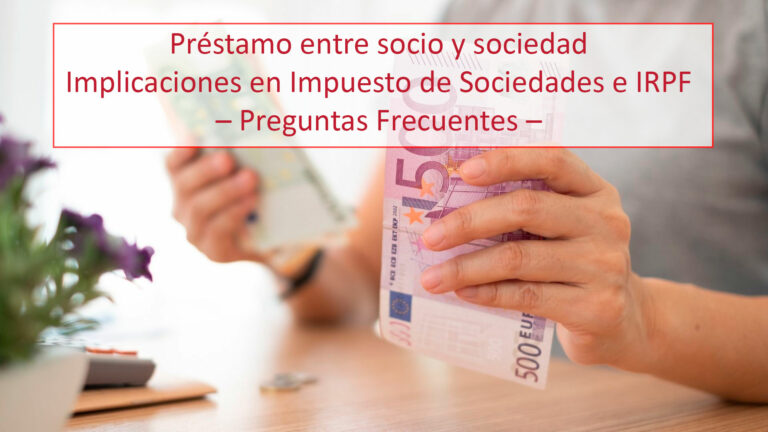
It is quite common, especially in times of crisis, for the shareholders of a commercial entity to contribute funds from their personal assets to strengthen the company’s cash flow and to be able to meet their payment obligations without having to go to a financial institution.
The usual practice is for the shareholder to contribute it to the company without any further formalities, so that it is recorded on the company’s balance sheet as a debt to the shareholder.
This is still a loan that the shareholder makes to the company and which has to be formalised by means of a contract, settling it in the corresponding Autonomous Community by means of the corresponding form (form 600 in the case of Andalusia). It results in zero tax liability as it is a transaction subject to but exempt from ITP-AJD as it is not signed with any guarantee.
The company will record it in its balance sheet, and will account for the interest expense to be paid to the partner, making the corresponding 19% withholding, which will have to be paid through the corresponding self-assessment, form 123, of the Tax Agency. What is an expense for the company will be income for the individual shareholder, who will have to pay personal income tax.
To answer this question we must turn to article 18.1 of Law 27/2014, of 27 November, on Corporate Income Tax (hereinafter, LIS), which indicates that the interest to be settled must be valued at market price, as these are transactions between related parties.
“1. Transactions between related persons or entities shall be valued at market value. Market value shall be taken to be the value that would have been agreed by independent persons or entities on arm’s length terms”.
The loan from the shareholder to the company is a related-party transaction, as indicated above, and will be included in Form 232 if all the transactions carried out in the tax period meet any of the following requirements:
The interest received by the individual shareholder on the amounts transferred to a company forms part of the savings base, subject to the limit of multiplying the company’s equity by three in proportion to the shareholding in the company.
All of this is regulated in Law 35/2006, of 28 November, on Personal Income Tax (hereinafter, LIRPF), specifically in article 46 thereof:
[…] However, the income from movable capital provided for in Article 25(2) of this Law corresponding to the excess of the amount of capital assigned to a related entity over the result of multiplying by three the equity, in the part corresponding to the taxpayer’s shareholding, of the latter shall form part of the general income.
For the purposes of calculating this excess, the amount of the related entity’s own funds as reflected in the balance sheet corresponding to the last financial year closed prior to the date of accrual of the tax and the percentage of the taxpayer’s shareholding existing on that date shall be taken into consideration.[…].
EXAMPLE:
An individual shareholder holds a 60% stake in a commercial entity whose equity, according to the latest balance sheet, amounts to 100,000 euros. During the tax year, he obtains €5,000 in interest from a loan granted to the entity amounting to €200,000.
Own capital assigned to the related company: 200,000 €.
Three times the shareholders’ equity according to the shareholder’s percentage: 3 x 100,000 x 0.60 = 180,000 €.
Excess equity transferred: 200.000 – 180.000 = 20.000 €.
General income interest: 5.000 x 20.000/200.000 = 500 €.
Interest on savings income: 6.000 – 500 = 5.500 €.
The original conditions of the city of Malaga and its coast (climate, geographical location, gastronomy,…
The rules for distributing dividends in capital companies are set out in Royal Legislative Decree…
The Supreme Court, in a recent ruling (STS 707/2023, of February 28) ruled on whether…
The presence of a notary public and the public faith that he or she imparts…
Individuals who acquire their tax residence in Spain as a result of moving to Spanish…
We obtain a favourable ruling in an eviction trial condemning the tenant to vacate the…